|
Spoilers: ²’ĶńŅõ 12.20 - "There Are No Angels Here"
┬ ²¶ĶÕ: 4 ņÓ 2006 ŃŅõÓ.
19.03.2006
Sunday Times of South Africa.
Posted by DrJTC.
HOT on TV
EMERGENCY SHOOT
Lesley Mofokeng travels to remote Kakamas to witness the filming of an episode of ER, and is astonished at finding glamour in the desert
æWhen it all started, sitcoms were king and drama was dead, but now things are differentÆ
ThereÆs nothing remotely exciting about the one-bakkie dorp of Kakamas. Vineyards, sand, blistering heat and donkeys are what this Kalahari Desert town is all about.
Even at our Joburg office, full of well-travelled journalists, we couldnÆt find Kakamas on the map and assumed it must be tucked away somewhere in the heart of Namibia.
ItÆs the last place in which youÆd expect to encounter TV glamour. So with great trepidation, I packed my bags for a weekend away in the windswept town Ś the carrot for me was an exclusive visit to the set of ER, M-NetÆs acclaimed medical drama series, and meeting the stars.
The doctors, played by Noah Wyle, Mekhi (pronounced Mac-high) Phifer and new addition Mary McCormack, as well as guest star Eamonn Walker, were in town to shoot episodes about the conflict in Darfur, Sudan.
This is part of season 12 of ER, which will be seen on M-Net in October. The current season ends on April 3.
ItÆs a stark environment. The plain between the hills of Kakamas and Riemvasmaak has been converted into the set of a makeshift camp for internally displaced people.
Afrikaans-speaking men and women from nearby Riemvasmaak, draped in cloth and white pyjama-like outfits, mill about, creating a convincing refugee-camp atmosphere.
The site is dotted with structures made out of plastic and dried plants, used as shelters; there are water towers, a mosque, a cemetery, a market with actual fruit and veggies, a school, a hospital complex and a football field.
The search for a suitable location took a month and the art department spent another month perfecting it.
The set easily passes for Darfur, what with the sparse vegetation, the mountains and the 40░C temperatures.
This is not the first time ER has featured an African conflict. Three years ago the Democratic Republic of The Congo fell under the spotlight, shot in Hawaii.
ERÆs success lies in its faithful representation of life. Insisting on realism, the creators use consultants who ensure the storyline and its telling is as credible as possible.
On set here is Marielle Bemelmans, a Dutch nurse and aid worker who was based in Darfur for 30 months. She is overwhelmed by a sense of dķjĆ vu.
Her role is to pay attention to details such as ensuring that the 500 or so extras are convincing as Sudanese Muslims, from the way their cloths are wrapped around their bodies to their body language and mannerisms. She adds authenticity to the images.
Bemelmans constantly consults a portfolio of pictures taken in camps in Sudan, and the similarities between them and the set are astonishing.
The market is abuzz and donkeys and goats roam while women sit under shelters or carry water containers Ś a convincing recreation of a Muslim community, with the sexes keeping to themselves.
Another consultant is at hand to advise on medic-speak, often proffering Latin names of diseases and medicines, and appropriate body language.
An Arabic-speaking Moroccan is on set as dialogue coach.
Director Christopher Chulack says that when the drama began in 1994, it redefined the genre. ōWhen it all started, sitcoms were king and drama was dead, but now things are different,ö he says. While ER caught fire, shows like Chicago Hope crashed.
What set ER apart was its pace. ōAlthough medicine and the hospital was the backdrop, it was always about the characters doing their jobs,ö says Chulack. ōThe pace came out of the freneticism of performing.ö
He says the Kakamas shoot is an ambitious co-operative project with American actors, producers and directors, a French camera crew, a Cameroonian crew and some South African cast members and extras.
ōItÆs quite an undertaking and we fly by the seats of our pants. We are working with a great South African crew and weÆre surprised by how smoothly it has gone, given the scope of it.ö
Significantly, ER hasnÆt lost any of its appeal after 12 years on air, despite the departure of George Clooney (Dr Ross), Julianna Margulies (head nurse Carol) and Anthony Edwards (Dr Greene).
And Chulack says it would have been unrealistic to expect the original six to remain in the show. In fact, he believes the departures have made the drama more appealing.
Wyle, dressed in bloodied clothes and bopping his head to music from his i-Pod, is the only remaining one of the original six. He has managed to sneak in some side projects, starring alongside Jennifer Lopez in Enough and Michelle Pfeiffer and Renķe Zellweger in White Oleander.
He is friendly and curious. He seems well informed and doesnÆt shy away from speaking his mind.
He believes his character, Dr John Carter, has some similarities to him, such as a strong work ethic, dedication to the notion of service, and passion.
Since he works closely with Human Rights Watch in California, and they published a definitive handbook of the conflict in Darfur, he is authoritative on the issue. ōIf we are successful, then people who are ignorant about Africa will have an idea of whatÆs going on. I still have a lot to learn myself.ö
Reflecting on his acting career, Wyle says ER has given him ōthe incredible freedom of financial independenceö and he can choose between projects.
Despite playing one of the most popular characters, Wyle still manages to lead a low-key life and enjoy privacy.
He says the culture of celebrity in the US diminishes the credibility of actors, one of the misgivings he has about being a household name.
If Wyle is the cool thinker, then Phifer represents cool hip. He is laid-back and has the aura of a hip-hop star. In safari khaki and minus the bling, he slumps in his chair, gulps water from a bottle and says he doesnÆt mind the heat. ōItÆs all good. IÆm from California, baby. ItÆs hot all year round.ö
Before embarking on ER in 2002, Phifer was the ōboyö in the video of The Boy Is Mine, the hit by R&B stars Brandy and Monica.
He scored a famous role in 8 Mile with Eminem and his name is mentioned in the latterÆs song Lose Yourself.
He confesses that he never knew much about displaced people and that the storyline was an eye-opener for him.
On playing Dr Gregory Pratt, he says: ōIÆm having a lot of fun. HeÆs strong-willed and unpredictable.ö
And he believes ER uses a winning formula, tackling real issues, from religion to politics, with an accomplished team of actors.
ōWe have a lot of fun on set. We hang out together and joke around as much as we work hard.ö Through his company, Facilitator Films, he has directed and produced the film Easier, Softer Way, to be released later this year.
Mary McCormack, who plays Debbie, is delighted to be in Africa and says itÆs a dream come true.
ōItÆs somewhere IÆve wanted to come for a long time, itÆs so far away and so different,ö says the chirpy actress.
ōThe physical beauty of South Africa is striking. There are so many textures Ś and they are all outstanding. ItÆs a great place to shoot in.ö
She believes the Darfur episodes will educate Americans about the Sudanese conflict and lead to action to improve the situation.
McCormack is in demand as an actress, especially after playing Kate Harper in The West Wing.
After such a generous dose of Hollywood stars, IÆm tempted to say Kakamas is indeed the place to be Ś at least while the ER lot are around.
Ģ Season 11 of ER ends on April 3. A new season of the drama will be back on M-Net in October 2006.
14.04.2006
NBC
ER --(10:00PM-11:01PM) --(TV-14)
.
"There Are No Angels Here"
.
THERE ARE NO ANGELS HERE-(EAMONN WALKER "OZ" AND MARY MCCORMACK "THE WEST WING" GUEST STAR) - Dr. Pratt (Mekhi Phifer) settles into his new job in Darfur but is troubled by astounding number of people needing care. A sheik and his pregnant wife come into Ramalah Camp looking for treatment. Carter (Noah Wyle) and Dakarai (Eamonn Walker) work on fixing the man's gunshot wound, but they are quickly interrupted by government officials trying to arrest the man. As Carter works on delivering the wife's baby, it is apparent that the mother is suffering from delivery complications. Pratt and Dakarai are forced to make journey at night to a hospital in El Fashir at the risk of getting stopped by the Janjaweed millitant group. Meanwhile, Debbie (Mary McCormack) tries to convince Dr. Dakarai to seek proper treatment for his medical condition.
19.04.2006
TV Guide
Although (Mehki Phifer) is sent to work with Carter (Noah Wyle) in Darfur as a punishment in the April 27 and May 4 episodes, the trip to South Africa was anything but a reprimand for Phifer and Wyle. When the two weren't filming scenes with guest stars Eamonn and Mary McCormack in Kakamas (located in the Kalari Desert on the Nothern Cape of South Africa), they were able to enjoy the country. Wyle had his wife and two kids--Owen 3 and Auden now 6 months--with him in south Africa, and Phifer's girlfriend Oni spent some time there too. Of course, Phifer had an additional job on top of his acting gig--taking some photos for TV Guide.
21.04.2006
TV Guide
In Darfur, Pratt and Carter treat a wounded sheik and his pregnant wife, who ends up needing to be moved to another medical facility in the middle of the night. During the journey, Pratt's stubborn arrogance takes over when he faces gun-toting militants. Dakarai: Eamonn Walker. Debbie: Mary McCormack. Carter: Noah Wyle.
įŅ“ŅŃÓ¶ĶĶ
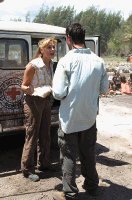
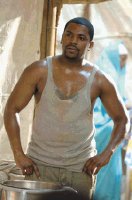
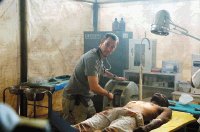
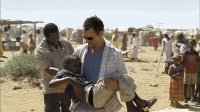
čĻĶĒ¹ ’ŅņŅ

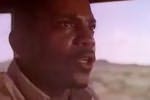
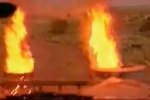
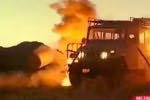
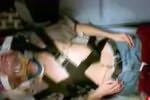


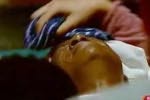









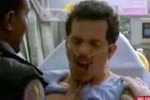
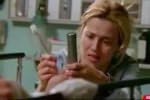
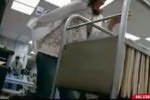
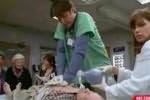
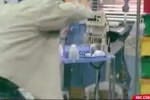


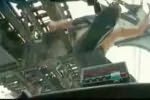

|
